A Research Proposal on Ethics of Technology in Education Context
VerifiedAdded on 2023/06/13
|21
|4951
|93
Project
AI Summary
This research proposal explores the ethical considerations surrounding the use of technology in education. It begins by establishing the background and importance of the topic, highlighting the potential ethical challenges arising from increased technology use and aiming to identify and address these issues. The proposal outlines key research questions focused on ethical factors influencing technology use, application of ethics in education, and implications of neglecting ethics. A review of relevant literature emphasizes concerns like internet privacy and the role of educational settings in maintaining ethical standards, including the responsibilities of teachers as role models and the need for student awareness of online safety. The proposal also addresses specific ethical issues such as unauthorized access and the importance of teaching ethical decision-making in the digital age. The document further details the research methodologies to be employed, including research philosophy, approach, data collection techniques (interviews and surveys), data analysis methods, and sampling strategies. A project plan is included, alongside ethical considerations and relevant references, providing a comprehensive framework for investigating and understanding the ethics of technology in education. Desklib provides this and many other solved assignments.
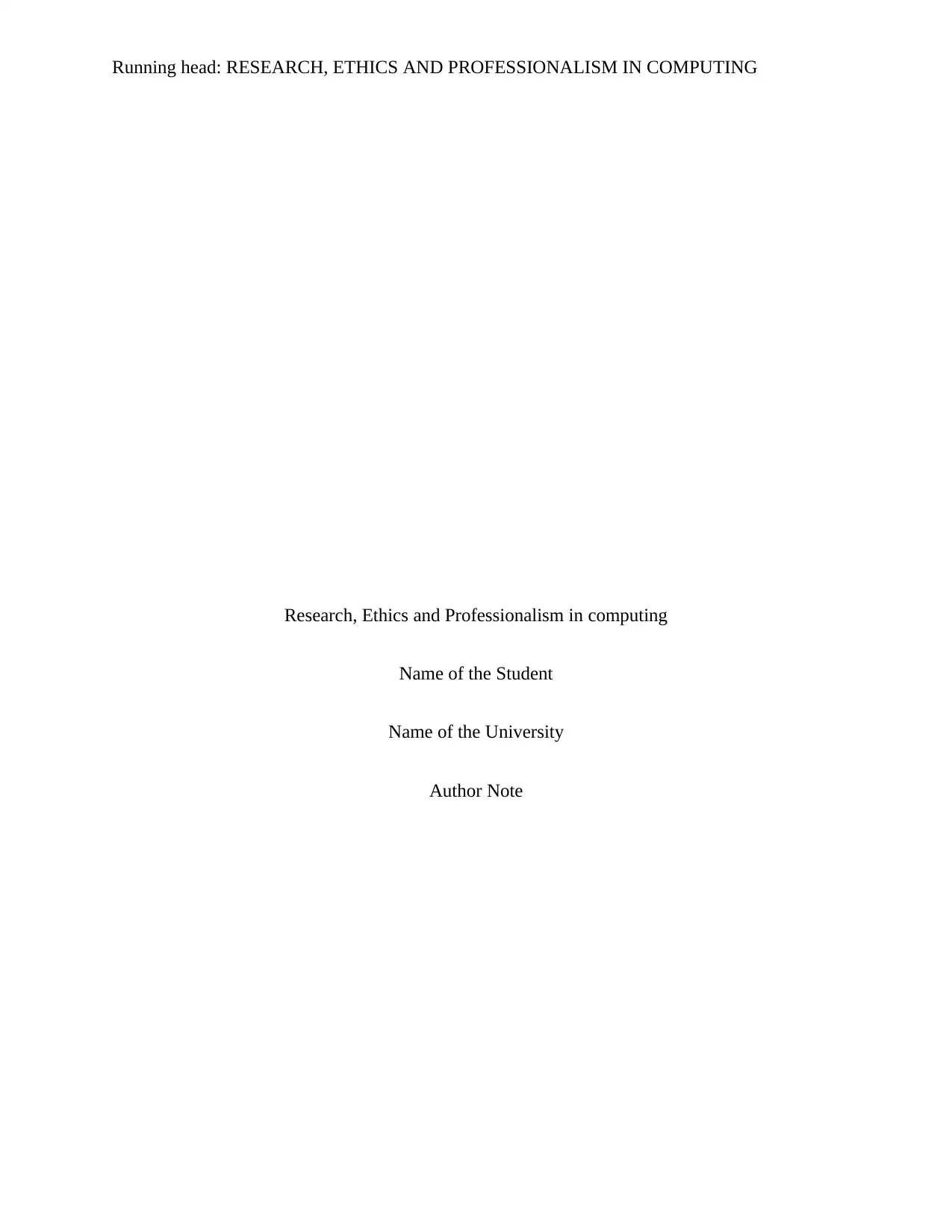
Running head: RESEARCH, ETHICS AND PROFESSIONALISM IN COMPUTING
Research, Ethics and Professionalism in computing
Name of the Student
Name of the University
Author Note
Research, Ethics and Professionalism in computing
Name of the Student
Name of the University
Author Note
Paraphrase This Document
Need a fresh take? Get an instant paraphrase of this document with our AI Paraphraser
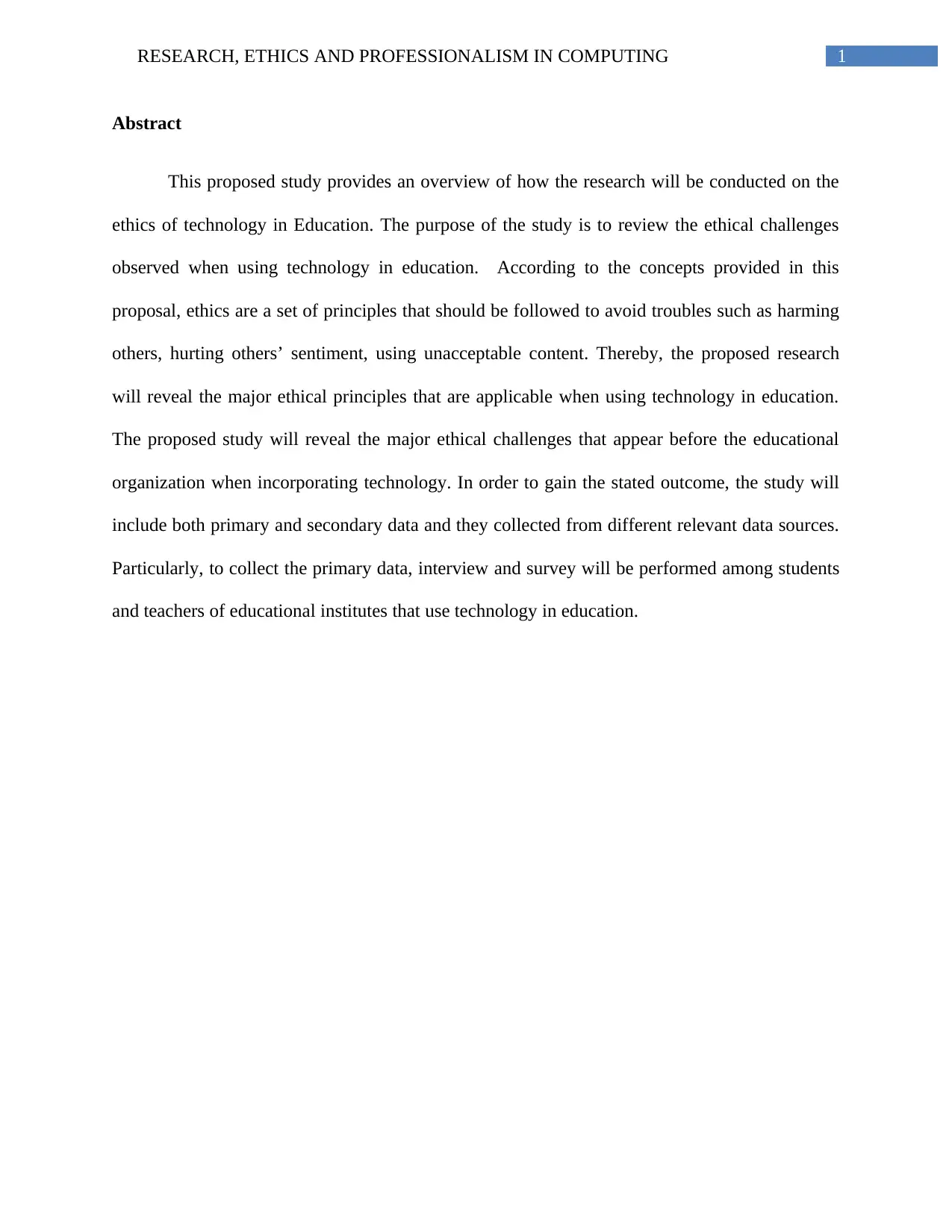
1RESEARCH, ETHICS AND PROFESSIONALISM IN COMPUTING
Abstract
This proposed study provides an overview of how the research will be conducted on the
ethics of technology in Education. The purpose of the study is to review the ethical challenges
observed when using technology in education. According to the concepts provided in this
proposal, ethics are a set of principles that should be followed to avoid troubles such as harming
others, hurting others’ sentiment, using unacceptable content. Thereby, the proposed research
will reveal the major ethical principles that are applicable when using technology in education.
The proposed study will reveal the major ethical challenges that appear before the educational
organization when incorporating technology. In order to gain the stated outcome, the study will
include both primary and secondary data and they collected from different relevant data sources.
Particularly, to collect the primary data, interview and survey will be performed among students
and teachers of educational institutes that use technology in education.
Abstract
This proposed study provides an overview of how the research will be conducted on the
ethics of technology in Education. The purpose of the study is to review the ethical challenges
observed when using technology in education. According to the concepts provided in this
proposal, ethics are a set of principles that should be followed to avoid troubles such as harming
others, hurting others’ sentiment, using unacceptable content. Thereby, the proposed research
will reveal the major ethical principles that are applicable when using technology in education.
The proposed study will reveal the major ethical challenges that appear before the educational
organization when incorporating technology. In order to gain the stated outcome, the study will
include both primary and secondary data and they collected from different relevant data sources.
Particularly, to collect the primary data, interview and survey will be performed among students
and teachers of educational institutes that use technology in education.
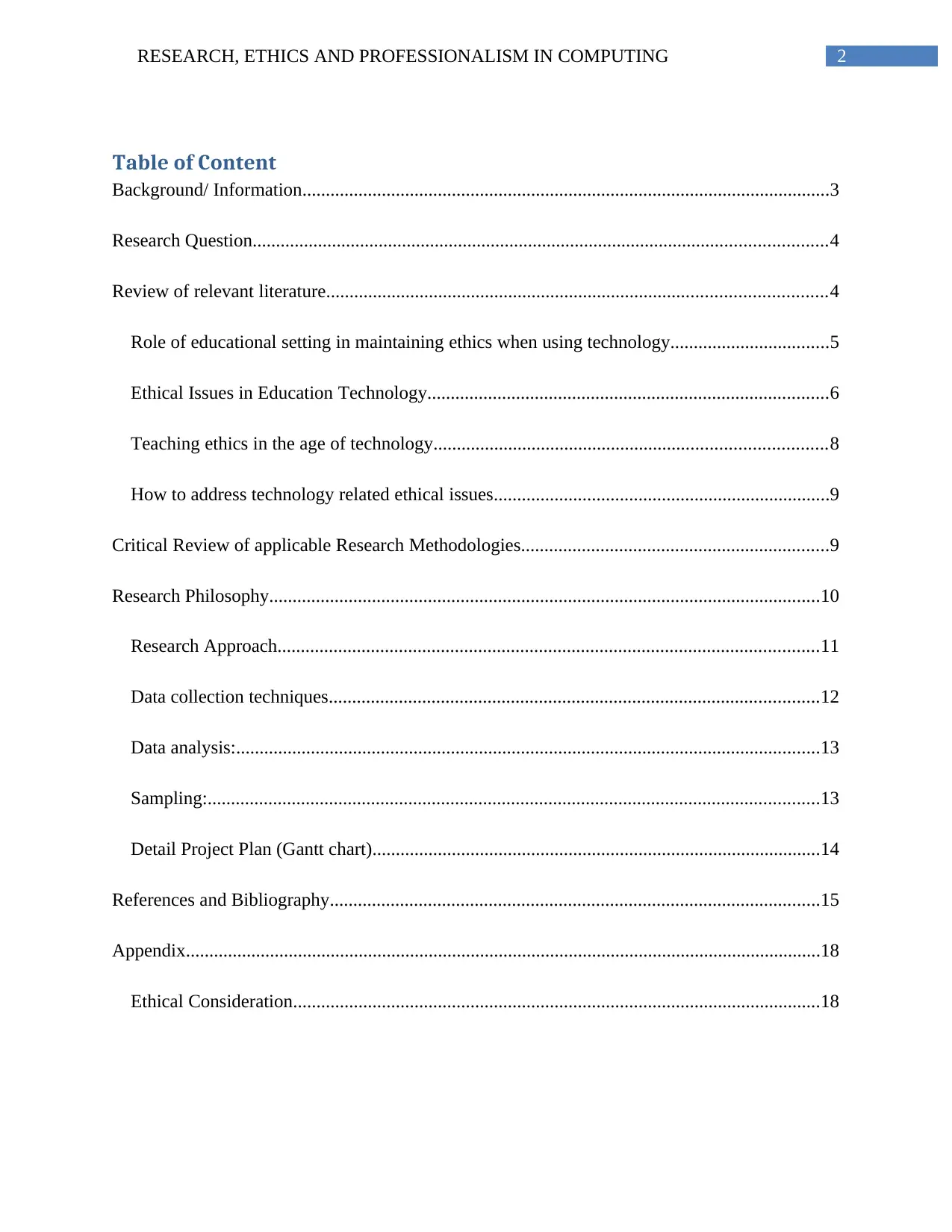
2RESEARCH, ETHICS AND PROFESSIONALISM IN COMPUTING
Table of Content
Background/ Information.................................................................................................................3
Research Question...........................................................................................................................4
Review of relevant literature...........................................................................................................4
Role of educational setting in maintaining ethics when using technology..................................5
Ethical Issues in Education Technology......................................................................................6
Teaching ethics in the age of technology....................................................................................8
How to address technology related ethical issues........................................................................9
Critical Review of applicable Research Methodologies..................................................................9
Research Philosophy......................................................................................................................10
Research Approach....................................................................................................................11
Data collection techniques.........................................................................................................12
Data analysis:.............................................................................................................................13
Sampling:...................................................................................................................................13
Detail Project Plan (Gantt chart)................................................................................................14
References and Bibliography.........................................................................................................15
Appendix........................................................................................................................................18
Ethical Consideration.................................................................................................................18
Table of Content
Background/ Information.................................................................................................................3
Research Question...........................................................................................................................4
Review of relevant literature...........................................................................................................4
Role of educational setting in maintaining ethics when using technology..................................5
Ethical Issues in Education Technology......................................................................................6
Teaching ethics in the age of technology....................................................................................8
How to address technology related ethical issues........................................................................9
Critical Review of applicable Research Methodologies..................................................................9
Research Philosophy......................................................................................................................10
Research Approach....................................................................................................................11
Data collection techniques.........................................................................................................12
Data analysis:.............................................................................................................................13
Sampling:...................................................................................................................................13
Detail Project Plan (Gantt chart)................................................................................................14
References and Bibliography.........................................................................................................15
Appendix........................................................................................................................................18
Ethical Consideration.................................................................................................................18
⊘ This is a preview!⊘
Do you want full access?
Subscribe today to unlock all pages.

Trusted by 1+ million students worldwide
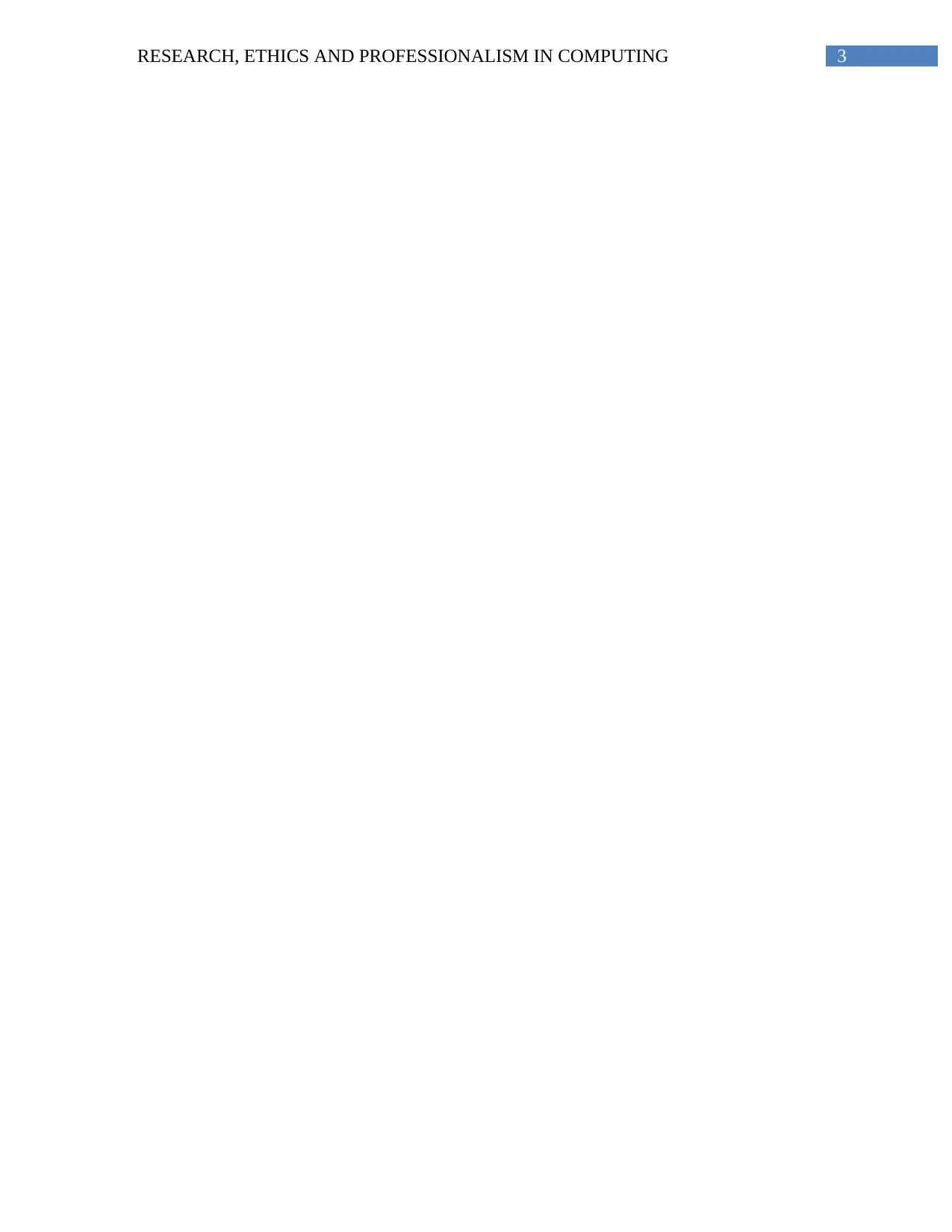
3RESEARCH, ETHICS AND PROFESSIONALISM IN COMPUTING
Paraphrase This Document
Need a fresh take? Get an instant paraphrase of this document with our AI Paraphraser
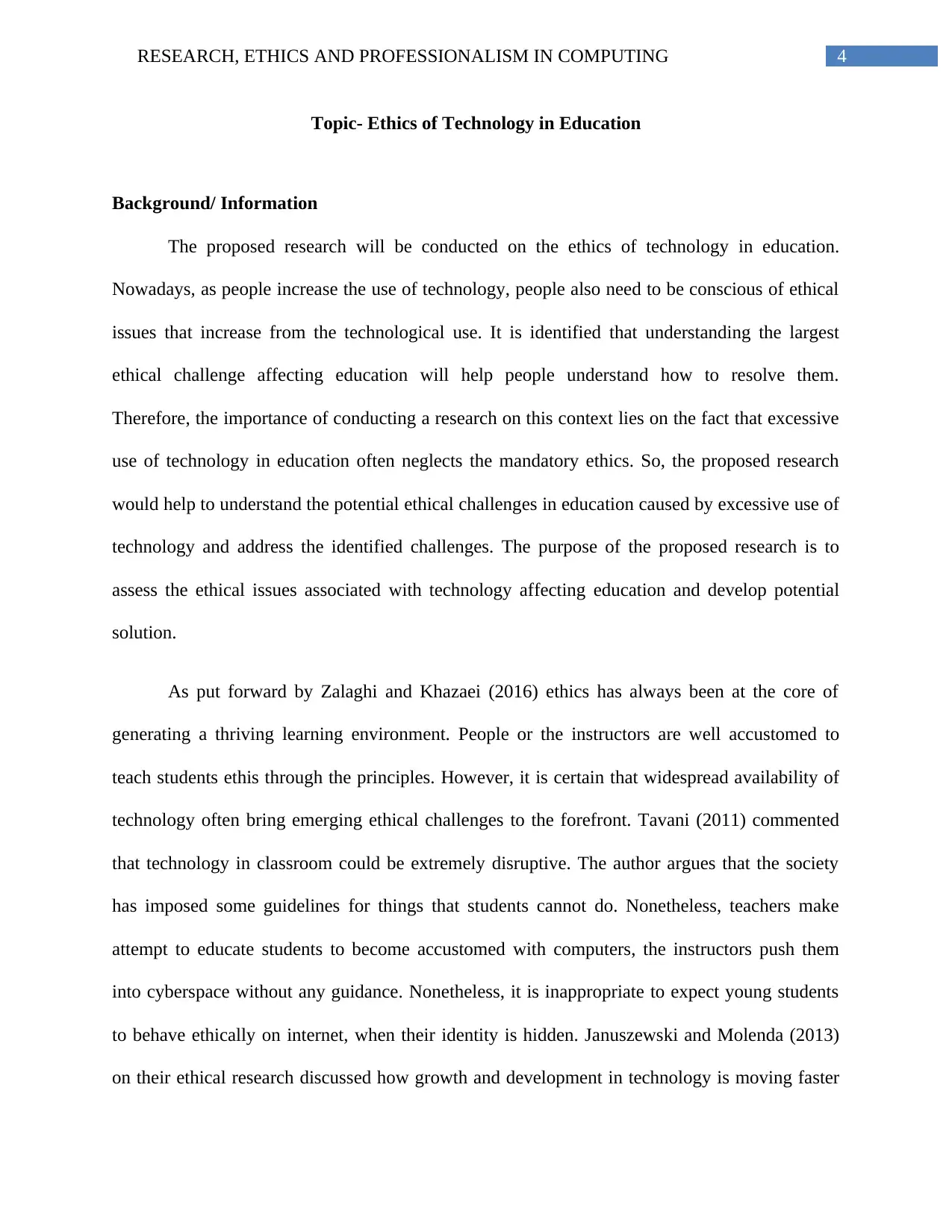
4RESEARCH, ETHICS AND PROFESSIONALISM IN COMPUTING
Topic- Ethics of Technology in Education
Background/ Information
The proposed research will be conducted on the ethics of technology in education.
Nowadays, as people increase the use of technology, people also need to be conscious of ethical
issues that increase from the technological use. It is identified that understanding the largest
ethical challenge affecting education will help people understand how to resolve them.
Therefore, the importance of conducting a research on this context lies on the fact that excessive
use of technology in education often neglects the mandatory ethics. So, the proposed research
would help to understand the potential ethical challenges in education caused by excessive use of
technology and address the identified challenges. The purpose of the proposed research is to
assess the ethical issues associated with technology affecting education and develop potential
solution.
As put forward by Zalaghi and Khazaei (2016) ethics has always been at the core of
generating a thriving learning environment. People or the instructors are well accustomed to
teach students ethis through the principles. However, it is certain that widespread availability of
technology often bring emerging ethical challenges to the forefront. Tavani (2011) commented
that technology in classroom could be extremely disruptive. The author argues that the society
has imposed some guidelines for things that students cannot do. Nonetheless, teachers make
attempt to educate students to become accustomed with computers, the instructors push them
into cyberspace without any guidance. Nonetheless, it is inappropriate to expect young students
to behave ethically on internet, when their identity is hidden. Januszewski and Molenda (2013)
on their ethical research discussed how growth and development in technology is moving faster
Topic- Ethics of Technology in Education
Background/ Information
The proposed research will be conducted on the ethics of technology in education.
Nowadays, as people increase the use of technology, people also need to be conscious of ethical
issues that increase from the technological use. It is identified that understanding the largest
ethical challenge affecting education will help people understand how to resolve them.
Therefore, the importance of conducting a research on this context lies on the fact that excessive
use of technology in education often neglects the mandatory ethics. So, the proposed research
would help to understand the potential ethical challenges in education caused by excessive use of
technology and address the identified challenges. The purpose of the proposed research is to
assess the ethical issues associated with technology affecting education and develop potential
solution.
As put forward by Zalaghi and Khazaei (2016) ethics has always been at the core of
generating a thriving learning environment. People or the instructors are well accustomed to
teach students ethis through the principles. However, it is certain that widespread availability of
technology often bring emerging ethical challenges to the forefront. Tavani (2011) commented
that technology in classroom could be extremely disruptive. The author argues that the society
has imposed some guidelines for things that students cannot do. Nonetheless, teachers make
attempt to educate students to become accustomed with computers, the instructors push them
into cyberspace without any guidance. Nonetheless, it is inappropriate to expect young students
to behave ethically on internet, when their identity is hidden. Januszewski and Molenda (2013)
on their ethical research discussed how growth and development in technology is moving faster
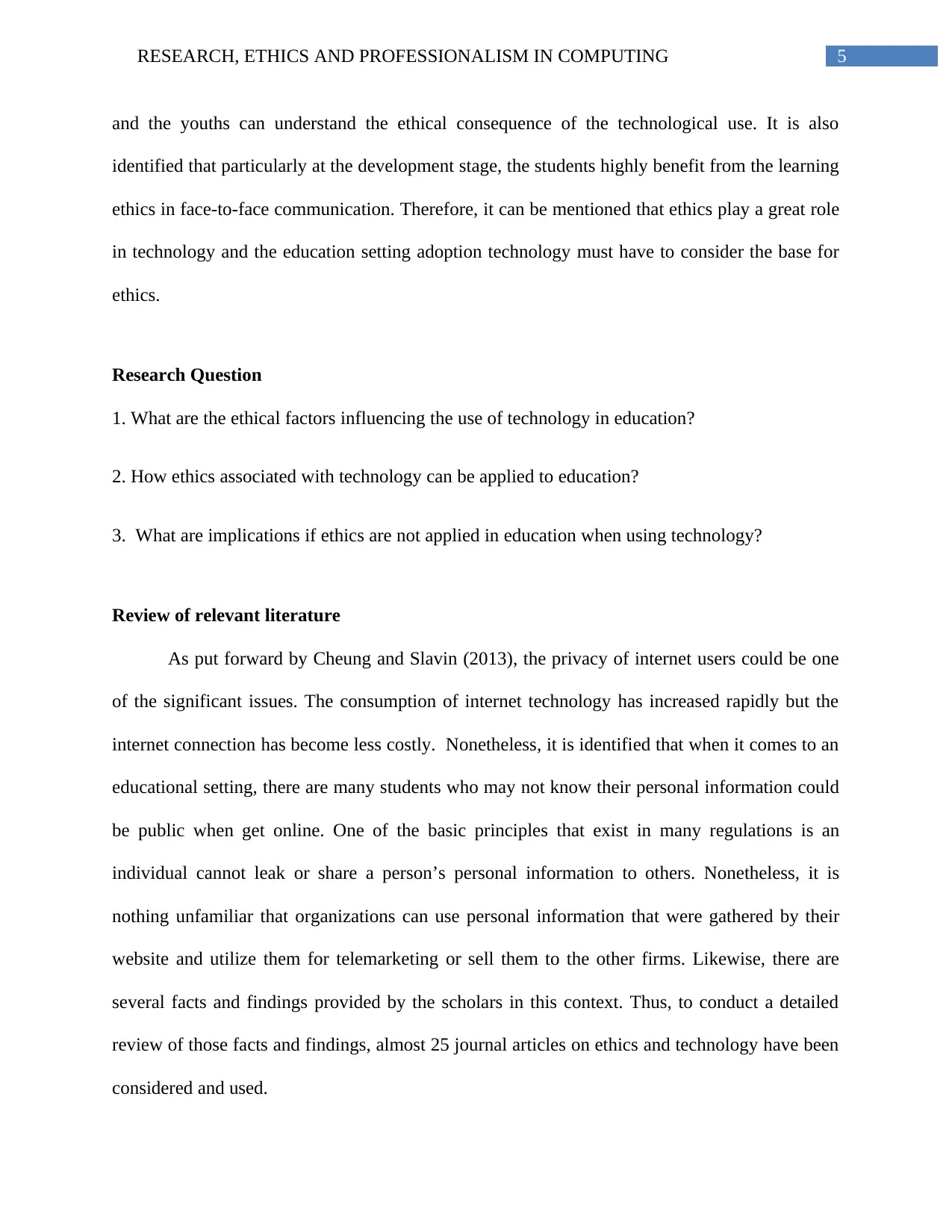
5RESEARCH, ETHICS AND PROFESSIONALISM IN COMPUTING
and the youths can understand the ethical consequence of the technological use. It is also
identified that particularly at the development stage, the students highly benefit from the learning
ethics in face-to-face communication. Therefore, it can be mentioned that ethics play a great role
in technology and the education setting adoption technology must have to consider the base for
ethics.
Research Question
1. What are the ethical factors influencing the use of technology in education?
2. How ethics associated with technology can be applied to education?
3. What are implications if ethics are not applied in education when using technology?
Review of relevant literature
As put forward by Cheung and Slavin (2013), the privacy of internet users could be one
of the significant issues. The consumption of internet technology has increased rapidly but the
internet connection has become less costly. Nonetheless, it is identified that when it comes to an
educational setting, there are many students who may not know their personal information could
be public when get online. One of the basic principles that exist in many regulations is an
individual cannot leak or share a person’s personal information to others. Nonetheless, it is
nothing unfamiliar that organizations can use personal information that were gathered by their
website and utilize them for telemarketing or sell them to the other firms. Likewise, there are
several facts and findings provided by the scholars in this context. Thus, to conduct a detailed
review of those facts and findings, almost 25 journal articles on ethics and technology have been
considered and used.
and the youths can understand the ethical consequence of the technological use. It is also
identified that particularly at the development stage, the students highly benefit from the learning
ethics in face-to-face communication. Therefore, it can be mentioned that ethics play a great role
in technology and the education setting adoption technology must have to consider the base for
ethics.
Research Question
1. What are the ethical factors influencing the use of technology in education?
2. How ethics associated with technology can be applied to education?
3. What are implications if ethics are not applied in education when using technology?
Review of relevant literature
As put forward by Cheung and Slavin (2013), the privacy of internet users could be one
of the significant issues. The consumption of internet technology has increased rapidly but the
internet connection has become less costly. Nonetheless, it is identified that when it comes to an
educational setting, there are many students who may not know their personal information could
be public when get online. One of the basic principles that exist in many regulations is an
individual cannot leak or share a person’s personal information to others. Nonetheless, it is
nothing unfamiliar that organizations can use personal information that were gathered by their
website and utilize them for telemarketing or sell them to the other firms. Likewise, there are
several facts and findings provided by the scholars in this context. Thus, to conduct a detailed
review of those facts and findings, almost 25 journal articles on ethics and technology have been
considered and used.
⊘ This is a preview!⊘
Do you want full access?
Subscribe today to unlock all pages.

Trusted by 1+ million students worldwide
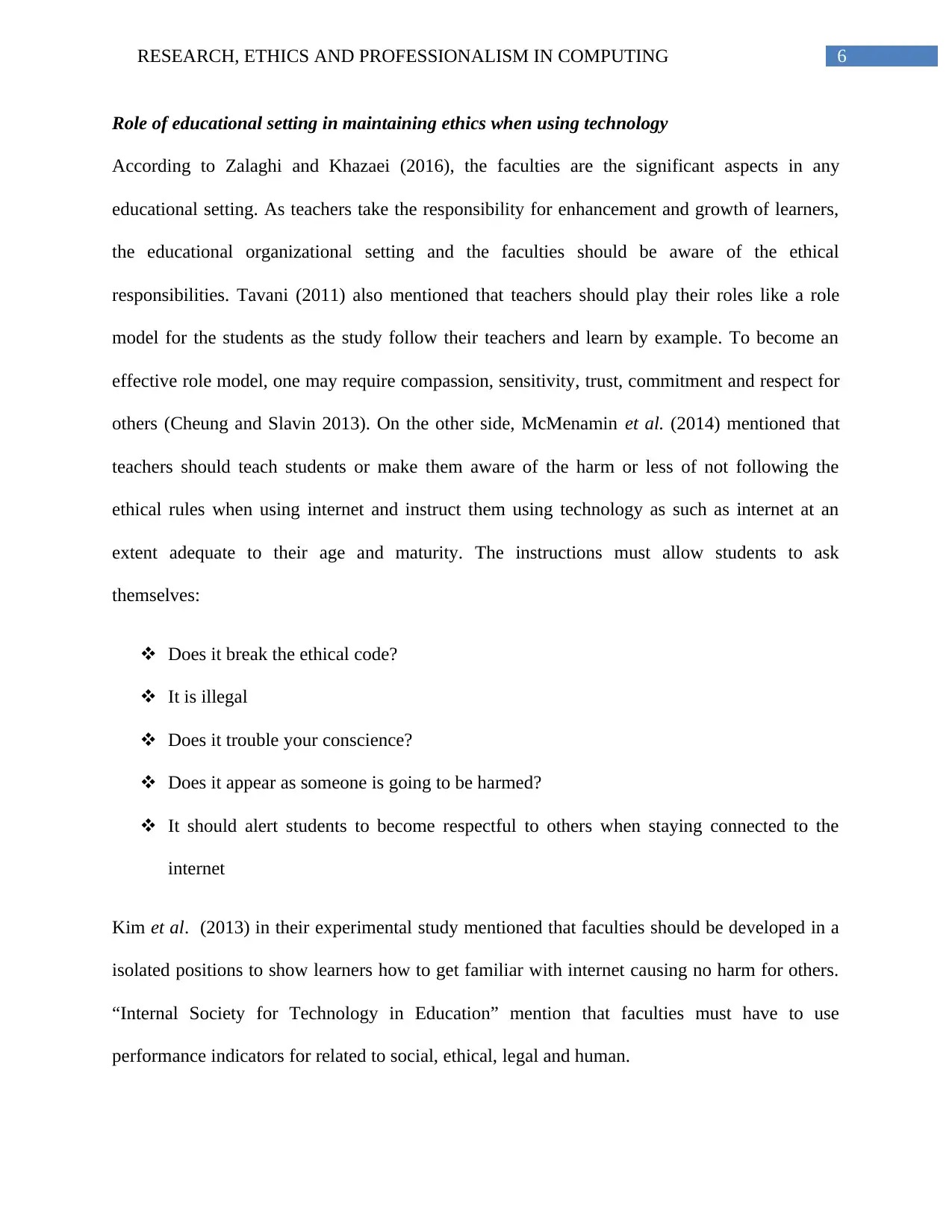
6RESEARCH, ETHICS AND PROFESSIONALISM IN COMPUTING
Role of educational setting in maintaining ethics when using technology
According to Zalaghi and Khazaei (2016), the faculties are the significant aspects in any
educational setting. As teachers take the responsibility for enhancement and growth of learners,
the educational organizational setting and the faculties should be aware of the ethical
responsibilities. Tavani (2011) also mentioned that teachers should play their roles like a role
model for the students as the study follow their teachers and learn by example. To become an
effective role model, one may require compassion, sensitivity, trust, commitment and respect for
others (Cheung and Slavin 2013). On the other side, McMenamin et al. (2014) mentioned that
teachers should teach students or make them aware of the harm or less of not following the
ethical rules when using internet and instruct them using technology as such as internet at an
extent adequate to their age and maturity. The instructions must allow students to ask
themselves:
Does it break the ethical code?
It is illegal
Does it trouble your conscience?
Does it appear as someone is going to be harmed?
It should alert students to become respectful to others when staying connected to the
internet
Kim et al. (2013) in their experimental study mentioned that faculties should be developed in a
isolated positions to show learners how to get familiar with internet causing no harm for others.
“Internal Society for Technology in Education” mention that faculties must have to use
performance indicators for related to social, ethical, legal and human.
Role of educational setting in maintaining ethics when using technology
According to Zalaghi and Khazaei (2016), the faculties are the significant aspects in any
educational setting. As teachers take the responsibility for enhancement and growth of learners,
the educational organizational setting and the faculties should be aware of the ethical
responsibilities. Tavani (2011) also mentioned that teachers should play their roles like a role
model for the students as the study follow their teachers and learn by example. To become an
effective role model, one may require compassion, sensitivity, trust, commitment and respect for
others (Cheung and Slavin 2013). On the other side, McMenamin et al. (2014) mentioned that
teachers should teach students or make them aware of the harm or less of not following the
ethical rules when using internet and instruct them using technology as such as internet at an
extent adequate to their age and maturity. The instructions must allow students to ask
themselves:
Does it break the ethical code?
It is illegal
Does it trouble your conscience?
Does it appear as someone is going to be harmed?
It should alert students to become respectful to others when staying connected to the
internet
Kim et al. (2013) in their experimental study mentioned that faculties should be developed in a
isolated positions to show learners how to get familiar with internet causing no harm for others.
“Internal Society for Technology in Education” mention that faculties must have to use
performance indicators for related to social, ethical, legal and human.
Paraphrase This Document
Need a fresh take? Get an instant paraphrase of this document with our AI Paraphraser
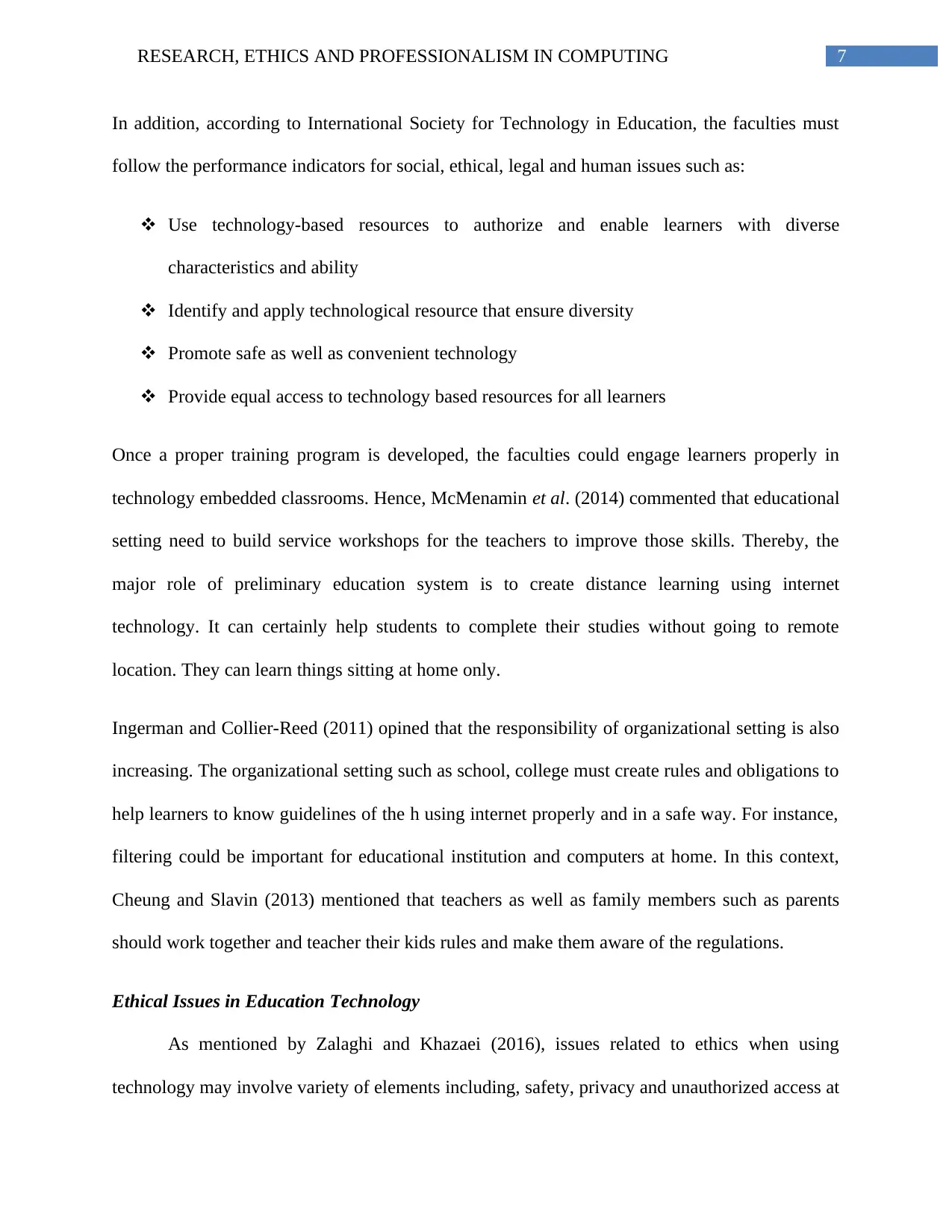
7RESEARCH, ETHICS AND PROFESSIONALISM IN COMPUTING
In addition, according to International Society for Technology in Education, the faculties must
follow the performance indicators for social, ethical, legal and human issues such as:
Use technology-based resources to authorize and enable learners with diverse
characteristics and ability
Identify and apply technological resource that ensure diversity
Promote safe as well as convenient technology
Provide equal access to technology based resources for all learners
Once a proper training program is developed, the faculties could engage learners properly in
technology embedded classrooms. Hence, McMenamin et al. (2014) commented that educational
setting need to build service workshops for the teachers to improve those skills. Thereby, the
major role of preliminary education system is to create distance learning using internet
technology. It can certainly help students to complete their studies without going to remote
location. They can learn things sitting at home only.
Ingerman and Collier-Reed (2011) opined that the responsibility of organizational setting is also
increasing. The organizational setting such as school, college must create rules and obligations to
help learners to know guidelines of the h using internet properly and in a safe way. For instance,
filtering could be important for educational institution and computers at home. In this context,
Cheung and Slavin (2013) mentioned that teachers as well as family members such as parents
should work together and teacher their kids rules and make them aware of the regulations.
Ethical Issues in Education Technology
As mentioned by Zalaghi and Khazaei (2016), issues related to ethics when using
technology may involve variety of elements including, safety, privacy and unauthorized access at
In addition, according to International Society for Technology in Education, the faculties must
follow the performance indicators for social, ethical, legal and human issues such as:
Use technology-based resources to authorize and enable learners with diverse
characteristics and ability
Identify and apply technological resource that ensure diversity
Promote safe as well as convenient technology
Provide equal access to technology based resources for all learners
Once a proper training program is developed, the faculties could engage learners properly in
technology embedded classrooms. Hence, McMenamin et al. (2014) commented that educational
setting need to build service workshops for the teachers to improve those skills. Thereby, the
major role of preliminary education system is to create distance learning using internet
technology. It can certainly help students to complete their studies without going to remote
location. They can learn things sitting at home only.
Ingerman and Collier-Reed (2011) opined that the responsibility of organizational setting is also
increasing. The organizational setting such as school, college must create rules and obligations to
help learners to know guidelines of the h using internet properly and in a safe way. For instance,
filtering could be important for educational institution and computers at home. In this context,
Cheung and Slavin (2013) mentioned that teachers as well as family members such as parents
should work together and teacher their kids rules and make them aware of the regulations.
Ethical Issues in Education Technology
As mentioned by Zalaghi and Khazaei (2016), issues related to ethics when using
technology may involve variety of elements including, safety, privacy and unauthorized access at
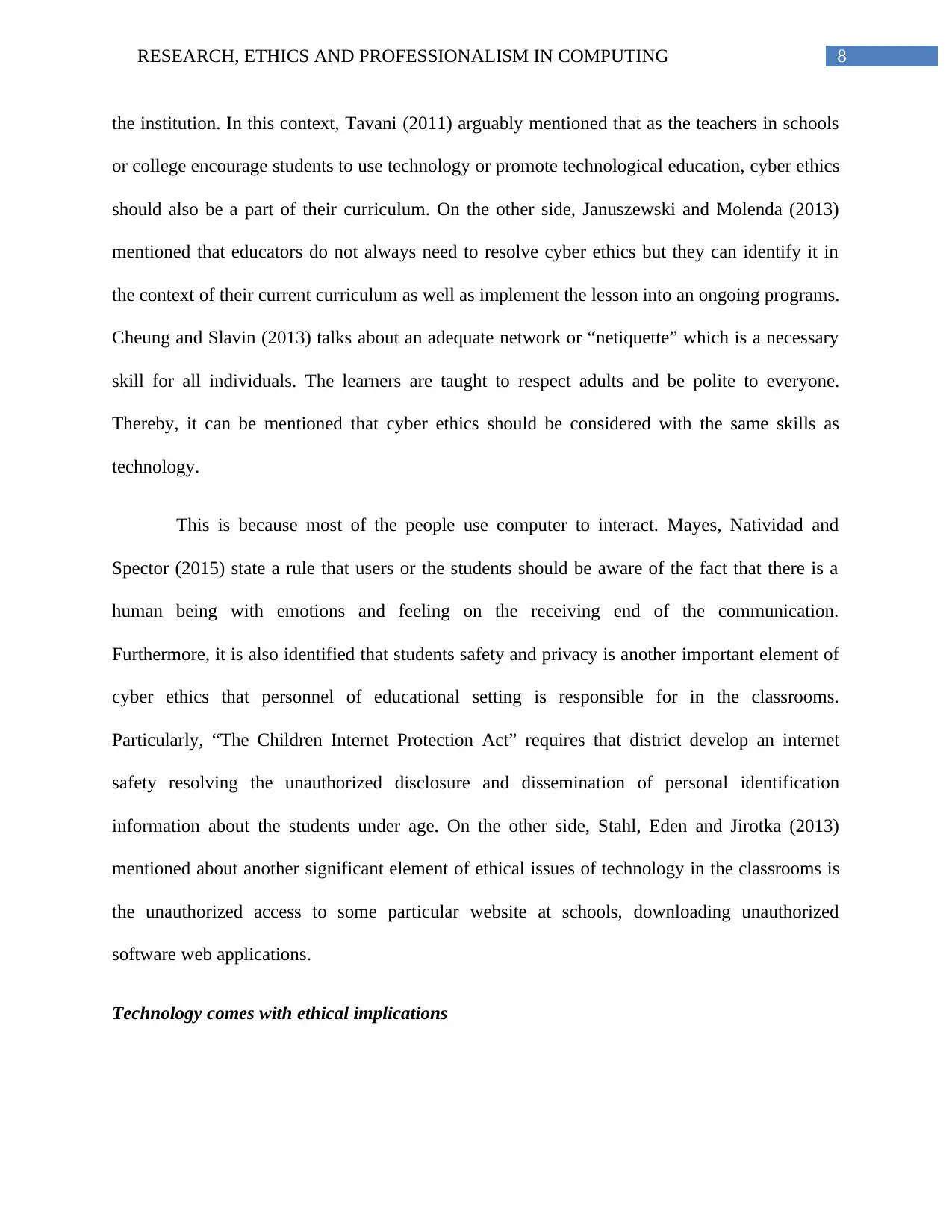
8RESEARCH, ETHICS AND PROFESSIONALISM IN COMPUTING
the institution. In this context, Tavani (2011) arguably mentioned that as the teachers in schools
or college encourage students to use technology or promote technological education, cyber ethics
should also be a part of their curriculum. On the other side, Januszewski and Molenda (2013)
mentioned that educators do not always need to resolve cyber ethics but they can identify it in
the context of their current curriculum as well as implement the lesson into an ongoing programs.
Cheung and Slavin (2013) talks about an adequate network or “netiquette” which is a necessary
skill for all individuals. The learners are taught to respect adults and be polite to everyone.
Thereby, it can be mentioned that cyber ethics should be considered with the same skills as
technology.
This is because most of the people use computer to interact. Mayes, Natividad and
Spector (2015) state a rule that users or the students should be aware of the fact that there is a
human being with emotions and feeling on the receiving end of the communication.
Furthermore, it is also identified that students safety and privacy is another important element of
cyber ethics that personnel of educational setting is responsible for in the classrooms.
Particularly, “The Children Internet Protection Act” requires that district develop an internet
safety resolving the unauthorized disclosure and dissemination of personal identification
information about the students under age. On the other side, Stahl, Eden and Jirotka (2013)
mentioned about another significant element of ethical issues of technology in the classrooms is
the unauthorized access to some particular website at schools, downloading unauthorized
software web applications.
Technology comes with ethical implications
the institution. In this context, Tavani (2011) arguably mentioned that as the teachers in schools
or college encourage students to use technology or promote technological education, cyber ethics
should also be a part of their curriculum. On the other side, Januszewski and Molenda (2013)
mentioned that educators do not always need to resolve cyber ethics but they can identify it in
the context of their current curriculum as well as implement the lesson into an ongoing programs.
Cheung and Slavin (2013) talks about an adequate network or “netiquette” which is a necessary
skill for all individuals. The learners are taught to respect adults and be polite to everyone.
Thereby, it can be mentioned that cyber ethics should be considered with the same skills as
technology.
This is because most of the people use computer to interact. Mayes, Natividad and
Spector (2015) state a rule that users or the students should be aware of the fact that there is a
human being with emotions and feeling on the receiving end of the communication.
Furthermore, it is also identified that students safety and privacy is another important element of
cyber ethics that personnel of educational setting is responsible for in the classrooms.
Particularly, “The Children Internet Protection Act” requires that district develop an internet
safety resolving the unauthorized disclosure and dissemination of personal identification
information about the students under age. On the other side, Stahl, Eden and Jirotka (2013)
mentioned about another significant element of ethical issues of technology in the classrooms is
the unauthorized access to some particular website at schools, downloading unauthorized
software web applications.
Technology comes with ethical implications
⊘ This is a preview!⊘
Do you want full access?
Subscribe today to unlock all pages.

Trusted by 1+ million students worldwide
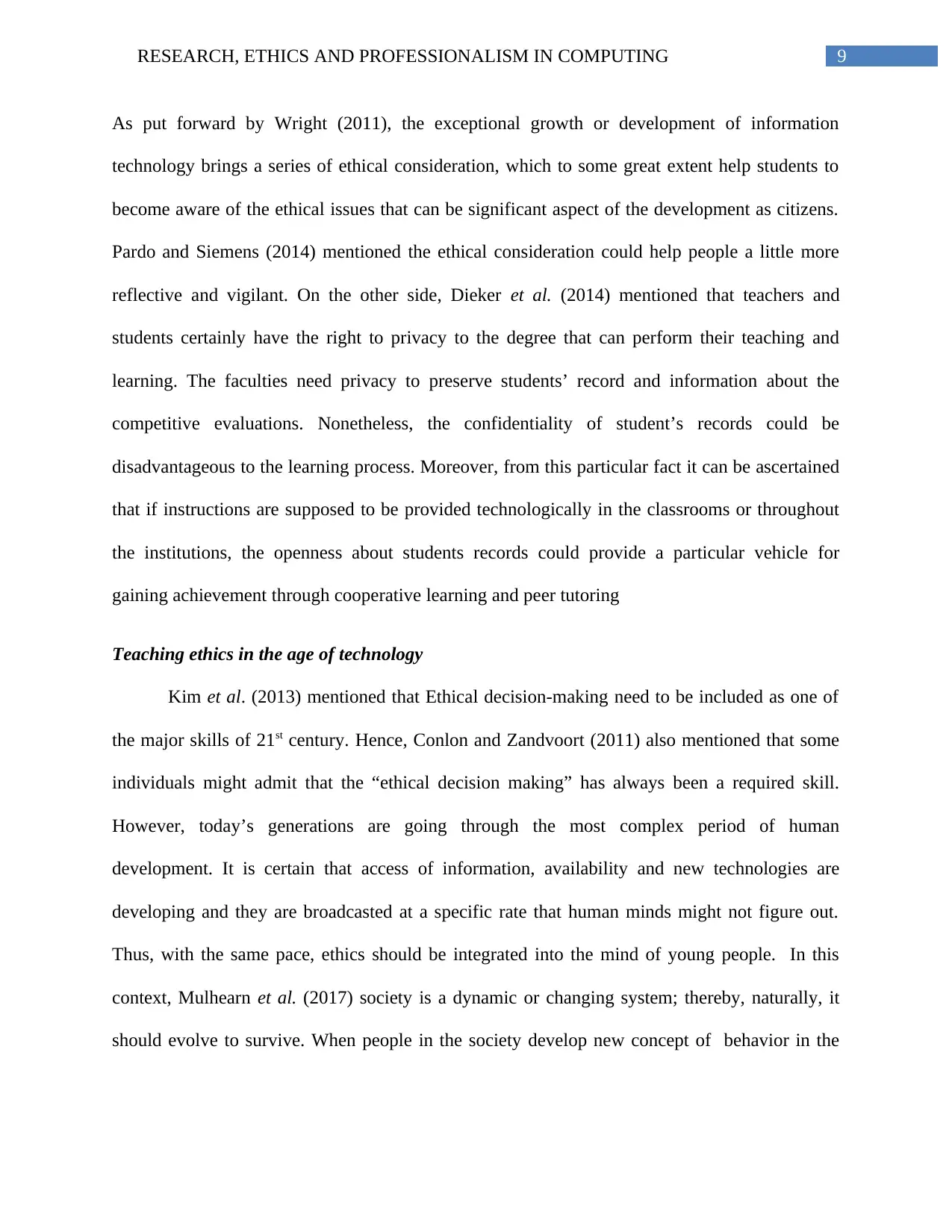
9RESEARCH, ETHICS AND PROFESSIONALISM IN COMPUTING
As put forward by Wright (2011), the exceptional growth or development of information
technology brings a series of ethical consideration, which to some great extent help students to
become aware of the ethical issues that can be significant aspect of the development as citizens.
Pardo and Siemens (2014) mentioned the ethical consideration could help people a little more
reflective and vigilant. On the other side, Dieker et al. (2014) mentioned that teachers and
students certainly have the right to privacy to the degree that can perform their teaching and
learning. The faculties need privacy to preserve students’ record and information about the
competitive evaluations. Nonetheless, the confidentiality of student’s records could be
disadvantageous to the learning process. Moreover, from this particular fact it can be ascertained
that if instructions are supposed to be provided technologically in the classrooms or throughout
the institutions, the openness about students records could provide a particular vehicle for
gaining achievement through cooperative learning and peer tutoring
Teaching ethics in the age of technology
Kim et al. (2013) mentioned that Ethical decision-making need to be included as one of
the major skills of 21st century. Hence, Conlon and Zandvoort (2011) also mentioned that some
individuals might admit that the “ethical decision making” has always been a required skill.
However, today’s generations are going through the most complex period of human
development. It is certain that access of information, availability and new technologies are
developing and they are broadcasted at a specific rate that human minds might not figure out.
Thus, with the same pace, ethics should be integrated into the mind of young people. In this
context, Mulhearn et al. (2017) society is a dynamic or changing system; thereby, naturally, it
should evolve to survive. When people in the society develop new concept of behavior in the
As put forward by Wright (2011), the exceptional growth or development of information
technology brings a series of ethical consideration, which to some great extent help students to
become aware of the ethical issues that can be significant aspect of the development as citizens.
Pardo and Siemens (2014) mentioned the ethical consideration could help people a little more
reflective and vigilant. On the other side, Dieker et al. (2014) mentioned that teachers and
students certainly have the right to privacy to the degree that can perform their teaching and
learning. The faculties need privacy to preserve students’ record and information about the
competitive evaluations. Nonetheless, the confidentiality of student’s records could be
disadvantageous to the learning process. Moreover, from this particular fact it can be ascertained
that if instructions are supposed to be provided technologically in the classrooms or throughout
the institutions, the openness about students records could provide a particular vehicle for
gaining achievement through cooperative learning and peer tutoring
Teaching ethics in the age of technology
Kim et al. (2013) mentioned that Ethical decision-making need to be included as one of
the major skills of 21st century. Hence, Conlon and Zandvoort (2011) also mentioned that some
individuals might admit that the “ethical decision making” has always been a required skill.
However, today’s generations are going through the most complex period of human
development. It is certain that access of information, availability and new technologies are
developing and they are broadcasted at a specific rate that human minds might not figure out.
Thus, with the same pace, ethics should be integrated into the mind of young people. In this
context, Mulhearn et al. (2017) society is a dynamic or changing system; thereby, naturally, it
should evolve to survive. When people in the society develop new concept of behavior in the
Paraphrase This Document
Need a fresh take? Get an instant paraphrase of this document with our AI Paraphraser
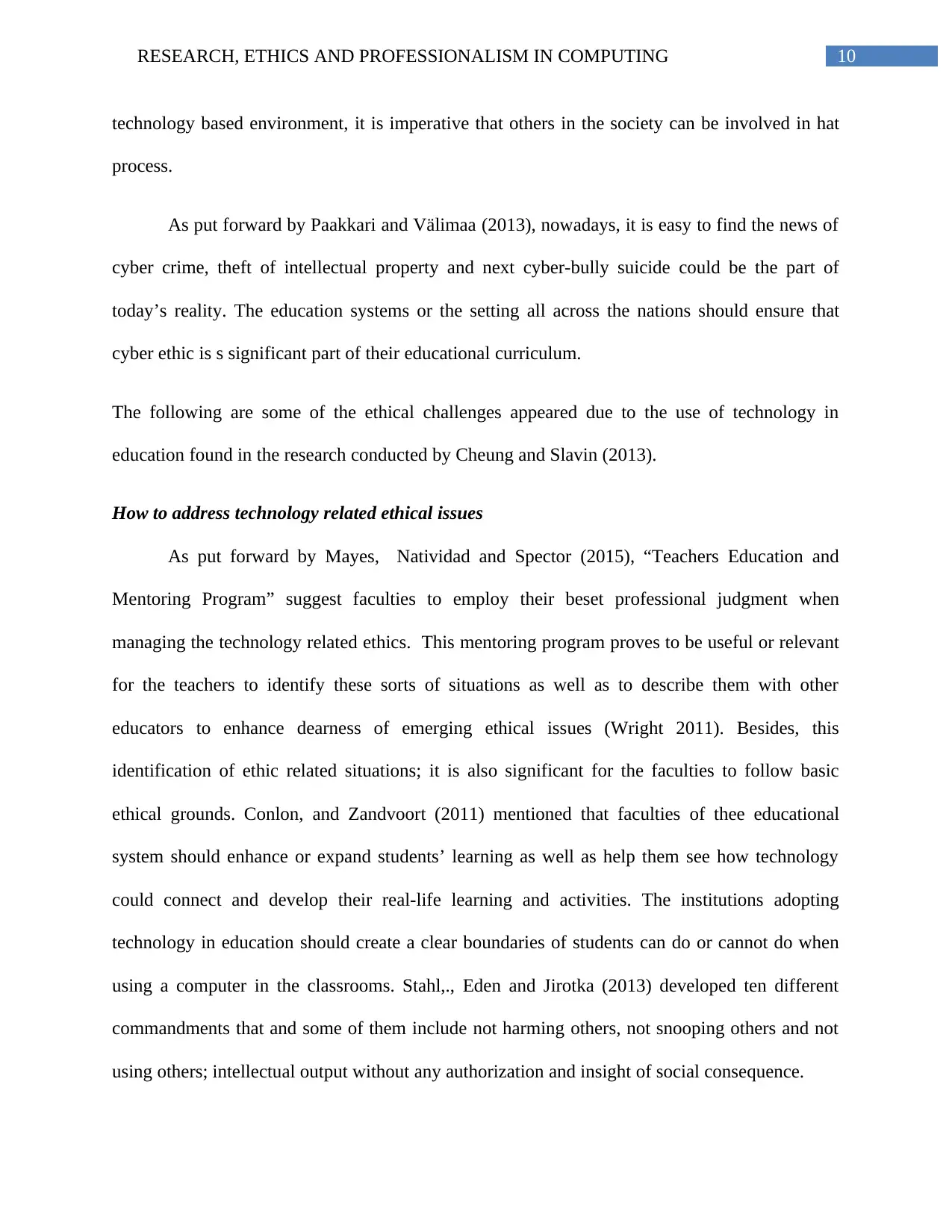
10RESEARCH, ETHICS AND PROFESSIONALISM IN COMPUTING
technology based environment, it is imperative that others in the society can be involved in hat
process.
As put forward by Paakkari and Välimaa (2013), nowadays, it is easy to find the news of
cyber crime, theft of intellectual property and next cyber-bully suicide could be the part of
today’s reality. The education systems or the setting all across the nations should ensure that
cyber ethic is s significant part of their educational curriculum.
The following are some of the ethical challenges appeared due to the use of technology in
education found in the research conducted by Cheung and Slavin (2013).
How to address technology related ethical issues
As put forward by Mayes, Natividad and Spector (2015), “Teachers Education and
Mentoring Program” suggest faculties to employ their beset professional judgment when
managing the technology related ethics. This mentoring program proves to be useful or relevant
for the teachers to identify these sorts of situations as well as to describe them with other
educators to enhance dearness of emerging ethical issues (Wright 2011). Besides, this
identification of ethic related situations; it is also significant for the faculties to follow basic
ethical grounds. Conlon, and Zandvoort (2011) mentioned that faculties of thee educational
system should enhance or expand students’ learning as well as help them see how technology
could connect and develop their real-life learning and activities. The institutions adopting
technology in education should create a clear boundaries of students can do or cannot do when
using a computer in the classrooms. Stahl,., Eden and Jirotka (2013) developed ten different
commandments that and some of them include not harming others, not snooping others and not
using others; intellectual output without any authorization and insight of social consequence.
technology based environment, it is imperative that others in the society can be involved in hat
process.
As put forward by Paakkari and Välimaa (2013), nowadays, it is easy to find the news of
cyber crime, theft of intellectual property and next cyber-bully suicide could be the part of
today’s reality. The education systems or the setting all across the nations should ensure that
cyber ethic is s significant part of their educational curriculum.
The following are some of the ethical challenges appeared due to the use of technology in
education found in the research conducted by Cheung and Slavin (2013).
How to address technology related ethical issues
As put forward by Mayes, Natividad and Spector (2015), “Teachers Education and
Mentoring Program” suggest faculties to employ their beset professional judgment when
managing the technology related ethics. This mentoring program proves to be useful or relevant
for the teachers to identify these sorts of situations as well as to describe them with other
educators to enhance dearness of emerging ethical issues (Wright 2011). Besides, this
identification of ethic related situations; it is also significant for the faculties to follow basic
ethical grounds. Conlon, and Zandvoort (2011) mentioned that faculties of thee educational
system should enhance or expand students’ learning as well as help them see how technology
could connect and develop their real-life learning and activities. The institutions adopting
technology in education should create a clear boundaries of students can do or cannot do when
using a computer in the classrooms. Stahl,., Eden and Jirotka (2013) developed ten different
commandments that and some of them include not harming others, not snooping others and not
using others; intellectual output without any authorization and insight of social consequence.
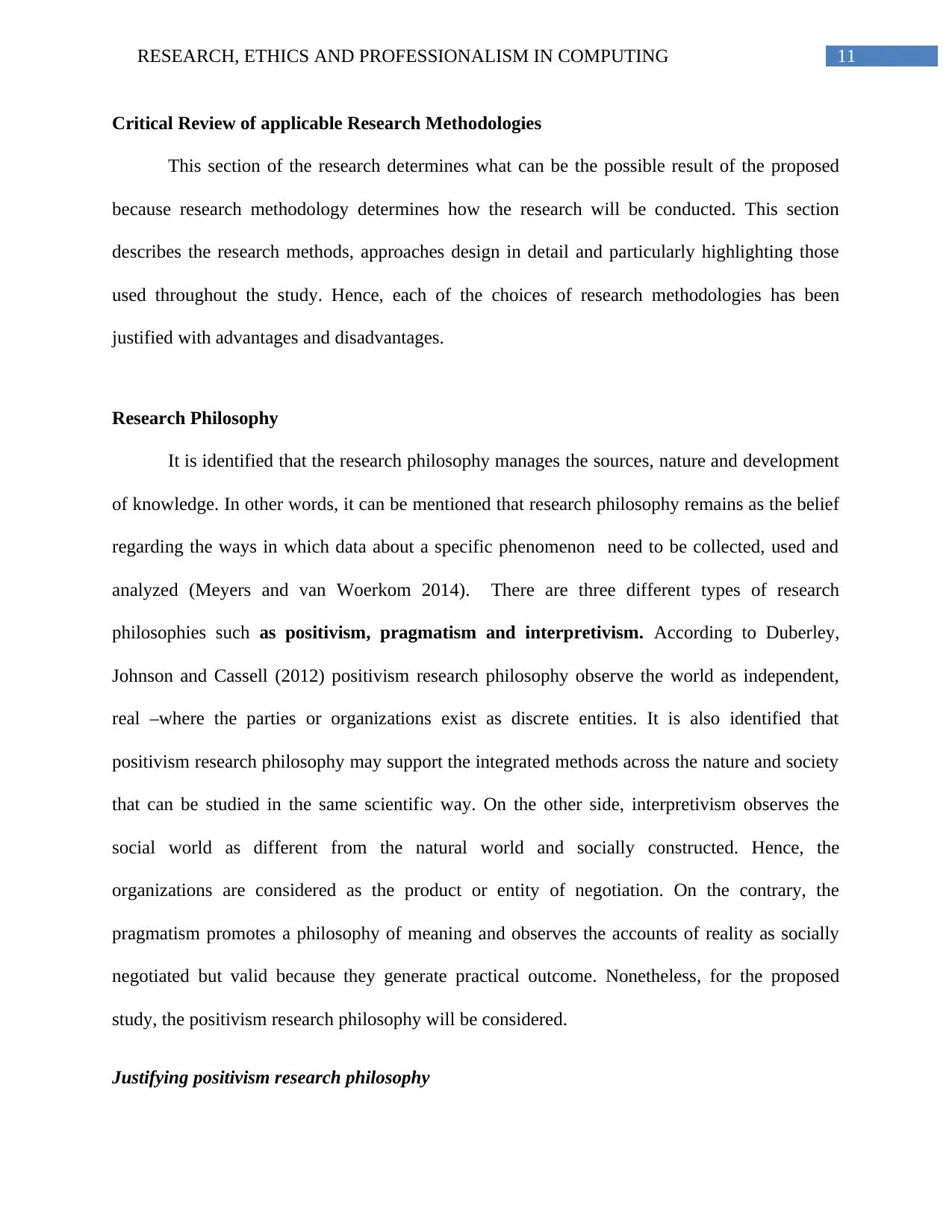
11RESEARCH, ETHICS AND PROFESSIONALISM IN COMPUTING
Critical Review of applicable Research Methodologies
This section of the research determines what can be the possible result of the proposed
because research methodology determines how the research will be conducted. This section
describes the research methods, approaches design in detail and particularly highlighting those
used throughout the study. Hence, each of the choices of research methodologies has been
justified with advantages and disadvantages.
Research Philosophy
It is identified that the research philosophy manages the sources, nature and development
of knowledge. In other words, it can be mentioned that research philosophy remains as the belief
regarding the ways in which data about a specific phenomenon need to be collected, used and
analyzed (Meyers and van Woerkom 2014). There are three different types of research
philosophies such as positivism, pragmatism and interpretivism. According to Duberley,
Johnson and Cassell (2012) positivism research philosophy observe the world as independent,
real –where the parties or organizations exist as discrete entities. It is also identified that
positivism research philosophy may support the integrated methods across the nature and society
that can be studied in the same scientific way. On the other side, interpretivism observes the
social world as different from the natural world and socially constructed. Hence, the
organizations are considered as the product or entity of negotiation. On the contrary, the
pragmatism promotes a philosophy of meaning and observes the accounts of reality as socially
negotiated but valid because they generate practical outcome. Nonetheless, for the proposed
study, the positivism research philosophy will be considered.
Justifying positivism research philosophy
Critical Review of applicable Research Methodologies
This section of the research determines what can be the possible result of the proposed
because research methodology determines how the research will be conducted. This section
describes the research methods, approaches design in detail and particularly highlighting those
used throughout the study. Hence, each of the choices of research methodologies has been
justified with advantages and disadvantages.
Research Philosophy
It is identified that the research philosophy manages the sources, nature and development
of knowledge. In other words, it can be mentioned that research philosophy remains as the belief
regarding the ways in which data about a specific phenomenon need to be collected, used and
analyzed (Meyers and van Woerkom 2014). There are three different types of research
philosophies such as positivism, pragmatism and interpretivism. According to Duberley,
Johnson and Cassell (2012) positivism research philosophy observe the world as independent,
real –where the parties or organizations exist as discrete entities. It is also identified that
positivism research philosophy may support the integrated methods across the nature and society
that can be studied in the same scientific way. On the other side, interpretivism observes the
social world as different from the natural world and socially constructed. Hence, the
organizations are considered as the product or entity of negotiation. On the contrary, the
pragmatism promotes a philosophy of meaning and observes the accounts of reality as socially
negotiated but valid because they generate practical outcome. Nonetheless, for the proposed
study, the positivism research philosophy will be considered.
Justifying positivism research philosophy
⊘ This is a preview!⊘
Do you want full access?
Subscribe today to unlock all pages.

Trusted by 1+ million students worldwide
1 out of 21
Related Documents
Your All-in-One AI-Powered Toolkit for Academic Success.
+13062052269
info@desklib.com
Available 24*7 on WhatsApp / Email
![[object Object]](/_next/static/media/star-bottom.7253800d.svg)
Unlock your academic potential
Copyright © 2020–2026 A2Z Services. All Rights Reserved. Developed and managed by ZUCOL.





